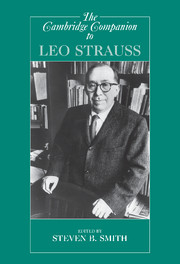Book contents
- Frontmatter
- 1 Introduction: Leo Strauss Today
- 2 Leo Strauss: The Outlines of a Life
- 3 Leo Strauss and the “Theologico-Political Predicament”
- 4 Strauss’s Recovery of Esotericism
- 5 Strauss’s Return to Premodern Thought
- 6 Leo Strauss and the Problem of the Modern
- 7 The Medieval Arabic Enlightenment
- 8 “To Spare the Vanquished and Crush the Arrogant”: Leo Strauss’s Lecture on “German Nihilism”
- 9 Leo Strauss’s Qualified Embrace of Liberal Democracy
- 10 Strauss and Social Science
- 11 The Complementarity of Political Philosophy and Liberal Education in the Thought of Leo Strauss
- 12 Straussians
- Bibliography
- Index
- Series List
1 - Introduction: Leo Strauss Today
Published online by Cambridge University Press: 28 November 2009
- Frontmatter
- 1 Introduction: Leo Strauss Today
- 2 Leo Strauss: The Outlines of a Life
- 3 Leo Strauss and the “Theologico-Political Predicament”
- 4 Strauss’s Recovery of Esotericism
- 5 Strauss’s Return to Premodern Thought
- 6 Leo Strauss and the Problem of the Modern
- 7 The Medieval Arabic Enlightenment
- 8 “To Spare the Vanquished and Crush the Arrogant”: Leo Strauss’s Lecture on “German Nihilism”
- 9 Leo Strauss’s Qualified Embrace of Liberal Democracy
- 10 Strauss and Social Science
- 11 The Complementarity of Political Philosophy and Liberal Education in the Thought of Leo Strauss
- 12 Straussians
- Bibliography
- Index
- Series List
Summary
Leo Strauss (1899-1973) was a central figure in the revival of the study of political philosophy. He was highly controversial during his lifetime, and the debates over his ideas and his legacy have only deepened in the years after his death. His writings attracted passionate defenders and equally passionate critics. His name itself has become an “ism”: Straussianism. There is considerable disagreement over the nature of Strauss's achievement even among those most intimately acquainted with his work. His attempt to revive the famous “quarrel between the ancients and the moderns” led many to wonder whether his loyalties were more with the world of ancient philosophy and politics than with modernity. His writings on the theme of what he metaphorically called “Jerusalem and Athens” led some to question whether his commitments were to the theistic tradition of revealed law or to secular forms of rationality. His recovery of the tradition of esoteric writing has led many to speculate whether his own writings conveyed a secret teaching intended for those initiated into the art of “careful reading.”
- Type
- Chapter
- Information
- The Cambridge Companion to Leo Strauss , pp. 1 - 12Publisher: Cambridge University PressPrint publication year: 2009
- 1
- Cited by

